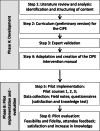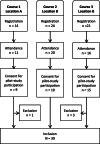Supporting migrants and refugees with posttraumatic stress disorder: development, pilot implementation, and pilot evaluation of a continuing interprofessional education for healthcare providers
- PMID: 32938450
- PMCID: PMC7493357
- DOI: 10.1186/s12909-020-02220-3
Supporting migrants and refugees with posttraumatic stress disorder: development, pilot implementation, and pilot evaluation of a continuing interprofessional education for healthcare providers
Abstract
Background: Refugees and migrants face an increased risk of developing posttraumatic stress disorder (PTSD). Adequate care can be insufficient due to language barriers, cultural differences, and knowledge deficits of health service providers. Therefore, professional associations requested that healthcare providers to be educated to provide culturally sensitive care. An evidence-based educational intervention in the form of a continuing interprofessional education (CIPE) for healthcare providers on the topic of PTSD in migrants and refugees was developed, pilot-implemented, and evaluated according to the first two levels of the Kirkpatrick evaluation model (reaction and learning).
Methods: The development of a curriculum for the CIPE intervention was based on a narrative literature review. Its content was validated by experts (N = 17) in an online survey and analyzed using both the Content Validity Index and a thematic analysis. The evaluation of the CIPE intervention was performed by conducting a pilot study with a quasi-experimental single group, using a pre-posttest design. In total, there were 39 participants distributed among three pilot courses. We collected and analyzed data on satisfaction, knowledge, and feasibility.
Results: The curriculum for a half-day course, consisting of 8 modules, showed almost excellent content validity (S-CVI = 0.92). In the pilot-implementation phase, participants were "very satisfied" with the pilot courses and a positive effect on their knowledge was detected. No correlation between satisfaction and knowledge gain was found.
Conclusions: The CIPE intervention can be considered feasible and seems promising in its effects on satisfaction and knowledge. The insights gained in this study can be used to adapt and optimize the educational intervention, whereby the feedback from course attendees is particularly useful. Future studies need to further examine the effects in larger samples and more robust study designs.
Keywords: Healthcare; Interprofessional continuing education; Kirkpatrick model; Knowledge; Migration; Pilot study; Posttraumatic stress disorder; Refugee; Satisfaction.
Conflict of interest statement
The authors declare that they have no competing interests.
Figures
References
-
- United Nations . International migration report 2017 [highlights] New York: United Nations; 2017.
-
- UNHCR. Figures at a Glance. UNHCR. 2019. https://www.unhcr.org/figures-at-a-glance.html. Accessed 19 Jun 2019.
-
- Federal Office for Migration and Refugees. Aktuelle Zahlen zu Asyl - Ausgabe: März 2019. 2019. http://www.bamf.de/SharedDocs/Anlagen/DE/Downloads/Infothek/Statistik/As.... .
-
- Brücker H, Rother N, Schupp J, editors. IAB-BAMF-SOEP-Befragung von Geflüchteten: Überblick und erste Ergebnisse - Forschungsbericht 29. 2016. http://www.bamf.de/SharedDocs/Anlagen/DE/Publikationen/Forschungsbericht.... .
Publication types
MeSH terms
Grants and funding
LinkOut - more resources
Full Text Sources
Medical



